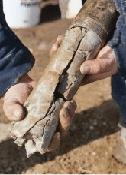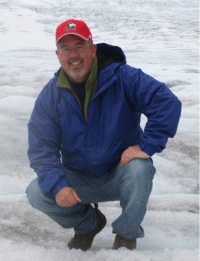ROCK CORE LOGGING FOR HYDROGEOLOGIC PROJECTS:
Assessing Recovery, RQD, Fractures and Stratigraphy
 This 90-minute webinar is designed to demystify the confusion associated with measuring rock core recovery and RQD while characterizing stratigraphy and fractures in rock cores.
This 90-minute webinar is designed to demystify the confusion associated with measuring rock core recovery and RQD while characterizing stratigraphy and fractures in rock cores.
Confusing methods, conflicting terms, and variations of published techniques have caused professionals to log core inconsistently and sometimes, incorrectly. The contrasting differences between geotechnical applications and hydrogeologic purposes have also contributed to different logging styles and methods that have resulted in insufficient information for hydrogeologic projects.
Learn to log and describe rock core for taking the mystery
out of the subsurface.
Participants will not only learn how to describe rock core, but also discover some field methods for helping to predict the nature and likelihood of fracture trends in certain rock types. In addition, participants will discover some important reasons to avoid the term "weathered" (slightly, moderately or highly) on their rock core descriptions and how to better characterize weathering and secondary alterations using common qualitative terms.
Learn how geologic context is key for success with logging both sediments and rock. In this webinar, we will also present up-to-date procedures for building the hydrogeologic framework during the field activities and their hydrogeologic applications.
This webinar will cover the following topics:
- Importance for differentiating three types of core recovery: Total, Solid, and Modified
- Calculating Rock Quality Determination (RQD)
- Identifying natural core breaks from drilling breaks
- Identifying the importance and application of water loss during coring and drilling
- Photographing rock core and placing and labeling rock cores in the box
- Describing rock cores of various rock types
- Reasons to avoid the term "weathered" on your logs and what to use instead
- Giving context to rock cores by building the litho- and hydrostratigraphic framework
- Assessing fracture networks from rock cores and understanding the story that rock cores are telling
Characterizing fractures is good, but understanding their context and distribution is a key for confident characterization. This webinar presents the common tool for thinking on your feet in the field and providing that geologic context.
Instructors Bio
Dan Kelleher, PG, CIPM
 Dan Kelleher is a hydrogeologist who strives for excellence in subsurface characterization. Dan earned his bachelor's degree from Monmouth College and master's degree at Northern Illinois University. His technical expertise is quantitative hydrogeology (in porous and fractured media), geotechnical analysis of sedimentary sequences, aquifer testing and predictive ground water modeling. He promotes field analysis during stratigraphic characterization from boring to boring in order to utilize QA/QC processes fully throughout a project and help identify unexpected conditions as soon as they arise.
Dan Kelleher is a hydrogeologist who strives for excellence in subsurface characterization. Dan earned his bachelor's degree from Monmouth College and master's degree at Northern Illinois University. His technical expertise is quantitative hydrogeology (in porous and fractured media), geotechnical analysis of sedimentary sequences, aquifer testing and predictive ground water modeling. He promotes field analysis during stratigraphic characterization from boring to boring in order to utilize QA/QC processes fully throughout a project and help identify unexpected conditions as soon as they arise.
| Fee: |
299.00 USD Per Webinar
|
| Materials and Downloads: |
Session Slides (PDF)
Record of Attendance Form (PDF)
|
Number of
Participants: |
AS OF JUNE 1, 2020, WEBINARS ARE PRICED FOR INDIVIDUALS WORKING ALONE. Pricing is discounted for individual registrations for people working alone.
|
Continuing
Education
Certificates: |
$14.95 each. Official CEU certificates are available as an option. After successful completion of this webinar, a link will be provided to order a certificate.
|
| Access: |
On-demand, anytime 24/7. |
| Discounts: |
Buy 3 on-demand webinars, and get 3 on-demand webinars for free!
|
| Duration: |
90 minutes |
| PDH Earned: |
1.5 hours |
| MA LSP: |
1.5 hours (MA LSP No. 1417-B) |
| |
|
| Instructor(s): |
Dan Kelleher, PG, CIPM, Author of the FIELD GUIDE FOR ROCK CORE LOGGING AND FRACTURE ANALYSIS |